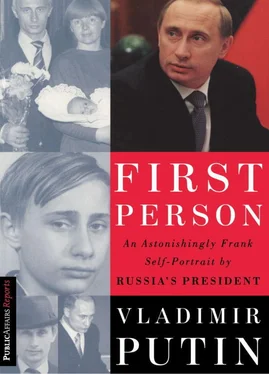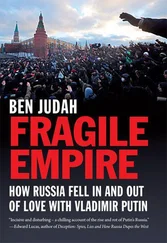Vladimir Putin - First Person
Здесь есть возможность читать онлайн «Vladimir Putin - First Person» весь текст электронной книги совершенно бесплатно (целиком полную версию без сокращений). В некоторых случаях можно слушать аудио, скачать через торрент в формате fb2 и присутствует краткое содержание. Город: New York, Год выпуска: 2000, ISBN: 2000, Издательство: PublicAffairs, Жанр: Биографии и Мемуары, Политика, Политика, Публицистика, на английском языке. Описание произведения, (предисловие) а так же отзывы посетителей доступны на портале библиотеки ЛибКат.
- Название:First Person
- Автор:
- Издательство:PublicAffairs
- Жанр:
- Год:2000
- Город:New York
- ISBN:978-0-786-72327-0
- Рейтинг книги:3 / 5. Голосов: 1
-
Избранное:Добавить в избранное
- Отзывы:
-
Ваша оценка:
- 60
- 1
- 2
- 3
- 4
- 5
First Person: краткое содержание, описание и аннотация
Предлагаем к чтению аннотацию, описание, краткое содержание или предисловие (зависит от того, что написал сам автор книги «First Person»). Если вы не нашли необходимую информацию о книге — напишите в комментариях, мы постараемся отыскать её.
First Person — читать онлайн бесплатно полную книгу (весь текст) целиком
Ниже представлен текст книги, разбитый по страницам. Система сохранения места последней прочитанной страницы, позволяет с удобством читать онлайн бесплатно книгу «First Person», без необходимости каждый раз заново искать на чём Вы остановились. Поставьте закладку, и сможете в любой момент перейти на страницу, на которой закончили чтение.
Интервал:
Закладка:
You’re wrong. He does understand. I recently discussed the problem with him in general terms. Shaimiev generally agreed with me.
Everyone understands what is eroding the overall economic and political sphere. And that is one of our priorities.
The next step is science and education. Without modern managers, without a contemporary understanding of what needs to be done, and without carriers of this understanding, it will be impossible to achieve results.
But those “carriers” have already left the country.
Not all of them. And we’ve preserved the most important thing—fundamental science and education. If we lose that, of course, it’s the end.
Where are you going to get the money for all of this?
You know, we don’t need that much money. The problem is not money. The problem is understanding.
Well what, for example, would you pay young specialists, taking into account their understanding?
Let’s say they are offered about $5,000 a month in the West. What if we were to pay them, theoretically speaking, $2,000 a month?
Oy!
Yes. And I bet the majority would not leave the country under those terms. To live in your own country, surrounded by your own language and peopleclose to you—your friends, your relatives, your acquaintances—and receive a little more money than others for that—it’s very advantageous.
Still, it doesn’t make sense. You intend to pay higher salaries to judges, the state bureaucracy, and the army, and you will also need more money for education and science. Where are you going to get it? What if America decides tomorrow to sell its strategic oil reserves? The prices will fall, and then…
We have money, but it has been slipping through our fingers. Until there is a strong state, we will remain dependent on someone’s strategic reserves.
You’re a specialist in law. Is the law immutable?
The law has to be observed, but if it becomes outdated, it must be altered. One of the postulates of legal theory is that the law always lags behind life.
What about our Constitution? Is it lagging behind life?
The Constitution should enshrine the most general principles. Therefore it lives longer than ordinary law. This is natural, since the Constitution guarantees society certain rules for the long term. But amendments can be made to it.
Should amendments be made to the section in the Constitution about the powers of the president? Should they be limited? In fact, another type of amendment is being contemplated now—increasing the term of office of the president to seven years.
I don’t know, maybe four years is enough time to get things done. But four years is a short term. The technical experts we’re working with are mapping out a year-by-year program of action. During the first, the agenda is to form goals and teams; during the second and part of the third, to gradually achieve concrete results; during the end of the third and the beginning of the fourth, to present our results and to begin the next election campaign. If that cycle is broken and everything is scattered, we won’t be able to get anything done, and we won’t be able to prepare for the next elections.
What about the powers of the president?
I can’t rule it out—amendments are possible. We must look carefully at how things are formulated and whether they correspond with the interests of the state and the society as a whole. If there are exceptional rights in the section on the powers of the president, then we should think about reviewing them. I believe this should be the subject of a broad discussion. But from the very beginning, Russia was created as a supercentralized state. That’s practically laid down in its genetic code, its traditions, and the mentality of its people.
If you want to take a historical approach to these issues, then monarchy is also embedded in Russian tradition. Does that mean we should restore it?
I think that is not very likely. But in general… in certain periods of time… in a certain place… under certain conditions… monarchy has played and continues to this day to play a positive role. In Spain, for instance. I think the monarchy played a decisive role in releasing the country from despotism and totalitarianism. The monarchy was clearly the stabilizing factor. The monarch doesn’t have to worry about whether or not he will be elected, or about petty political interests, or about how to influence the electorate. He can think about the destiny of the people and not become distracted with trivialities.
And the prime minister will think about everything else.
Yes, the government.
But in Russia, that’s not possible.
You know, there’s a lot that seems impossible and incredible and then— bang! Look what happened to the Soviet Union. Who could have imagined that it would simply collapse? No one saw that coming—even in their worst night-mares.
Were you present at the burial of the remains of the czar’s family in St. Petersburg?
No.
What do you think? Was burying them the right thing to do?
I think so.
Should the state have relations with big business?
Definitely, because a lot depends on big business. But relations between the state and business should be defined by the law and by general rules. Businesses want this sort of regulation too, so that the state can’t play favorites and so that they’re all competing under equal conditions.
So you don’t rule out dealing with big businessmen?
Of course not. I think the state has to listen to both workers and trade unions as well as to the representatives of big business and associations of entrepreneurs. Much depends on the policies of firms and major companies. How can I pretend that this doesn’t matter to me? That would be a mistake. But the state should not command business.
On the question of favorites: in an interview, Boris Berezovsky [33] Boris Berezovsky is a prominent and influential Russian businessman. He is part-owner of ORT, a pro-government television station, and has taken an active role in the Chechen conflicts. He was former deputy secretary of the National Security Council in the Yeltsin administration.
said that he meets with you once a month. Is that true?
It’s probably less often.
On whose initiative?
On his. He has such a lively mind. Most of his ideas are connected to the Caucasus—to Chechnya and Karachay-Cherkessia. He was, after all, deputy secretary of the Security Council, and worked on these issues. Incidentally, in my view, his proposals on Chechnya are not realistic or effective. Frankly speaking, that is why nothing that he has proposed is being implemented. From time to time, I not only meet with Berezovsky but also with other businessmen—for example Petr Aven, Potanin, and Alekperov.
Your wife said that you don’t like to discuss your work colleagues. But we’re interested in people. In Boris Nikolayevich Yeltsin, for example….
Do you want me to give you an evaluation of his role in history?
Well, you did have a relationship with him, including a personal one.
I did not have a particularly close relationship with Boris Nikolayevich, just a good working relationship. He treats me very well and I am grateful to him for that. I hardly ever meet him in regular life.
And you don’t play tennis?
And I don’t play tennis. Before his retirement, I visited Yeltsin at home only on work-related matters. Moreover, I can say that only when he began to discuss the question of his resignation with me did I sense a certain warmth in him.
Читать дальшеИнтервал:
Закладка:
Похожие книги на «First Person»
Представляем Вашему вниманию похожие книги на «First Person» списком для выбора. Мы отобрали схожую по названию и смыслу литературу в надежде предоставить читателям больше вариантов отыскать новые, интересные, ещё непрочитанные произведения.
Обсуждение, отзывы о книге «First Person» и просто собственные мнения читателей. Оставьте ваши комментарии, напишите, что Вы думаете о произведении, его смысле или главных героях. Укажите что конкретно понравилось, а что нет, и почему Вы так считаете.












